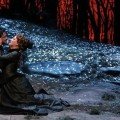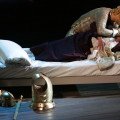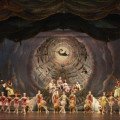The specter of the 1955 legendary edition by Callas – Visconti – Giulini hovered on this “Traviata”. However, the impression of a spectacle hard to love and sometimes even to accept still lasts – A review by Davide Annachini
 La Traviata is historically the most risky title the Teatro alla Scala can put on the bill: the specter of the 1955 legendary edition by Callas – Visconti – Giulini still lingers, despite the praised edition by Riccardo Muti has stopped at the time that fearful ostracism lasted decades. Therefore, proposing La Traviata at La Scala for the opening of the 2013/14 opera season – at the end of the Verdi year and during the last months of Lissner’s period of management – was certainly a courageous choice, but it payed to possible critics for an unconventional staging. As every people watching the live broadcast of December 7th could see, the premiere registred heavy complaints addressed to the director and a mix of consent / dissent for conducting and content. Only to convince all the public was Diana Damrau as Violetta. The singer expressed herself on international levels, showing professionalism and coolness. As expected, during replications the mood calmed down, so when I attended the performance – beyond a certain coldness of the public during the representation – it was possible to speak of a widely happy outcome.
La Traviata is historically the most risky title the Teatro alla Scala can put on the bill: the specter of the 1955 legendary edition by Callas – Visconti – Giulini still lingers, despite the praised edition by Riccardo Muti has stopped at the time that fearful ostracism lasted decades. Therefore, proposing La Traviata at La Scala for the opening of the 2013/14 opera season – at the end of the Verdi year and during the last months of Lissner’s period of management – was certainly a courageous choice, but it payed to possible critics for an unconventional staging. As every people watching the live broadcast of December 7th could see, the premiere registred heavy complaints addressed to the director and a mix of consent / dissent for conducting and content. Only to convince all the public was Diana Damrau as Violetta. The singer expressed herself on international levels, showing professionalism and coolness. As expected, during replications the mood calmed down, so when I attended the performance – beyond a certain coldness of the public during the representation – it was possible to speak of a widely happy outcome.
However, the impression of a spectacle hard to love and sometimes even to accept still lasted, especially during the acts of the two parties, in which the capacity of director Dmitry Černjakov to hold the scenic discourse suggested by the relentless pace of the music was tiresome, ineffectual and forced. He described a preposterous society beyond every limit (awful costumes by Yelena Zaytseva) and hardly credible in the ability to have fun of anything. Starting from the protagonist, who by dint of laughing and gesturing looked more like a musical character than operistic. The second act, set by Černjakov in the large kitchen of a country house furnished in Provencal style, was overflowed by a descriptive frenzy. Violetta, worn the clothes of a sloppy housewife, does not had a moment of rest between jugs, pots and cups, while Alfredo idleness rolled the dough with a rolling pin and frantically sliced vegetables for the minestrone. In addition, the intimacy of the solos or duets was deprived with the omnipresence of a silent witness, represented by the maid Annina (here trusted confidant of Violetta, transformed into a grotesque ex-maȋtresse in Ozpetek style) or the servant Giuseppe.
Elsewhere, however, the director hits the mark of a realism in tune to the opera. As in the last act, during which the desperate loneliness of Violetta finds its proper expression in an alcohol addicted intoxicated by barbiturates: reflecting on the end of his life with a poignant “Addio al passato“, she buries herself under a huge duvet. I was also convinced by the protagonist when she acted with a less victim attitude and more rebellious against Alfredo, especially when she rejected him beating her fists on his chest than when she consoled him by patting pathetically on his shoulder.
As to the musical component, I have to recognize a global high-level result, starting with Damrau again. Despite the indefensible costumes and wigs she wears (how can a rather buxom singer be presented in bare arms, wearing like a Betty Boop or Minnie Minoprio?), she made her character completely, convincing the audience and winning over that thanks to her extraordinary vocal mastery, especially for her overwhelming passion in interpretation. The ability to leave the contours of an excellent virtuous to plunge into the passionate singing of authentic lyric soprano timbre, rich and luminous as vibrant and generous in the vocal emission, has witnessed Damrau’s determination to be a great interpreter above all. Precisely for this reason her Violetta has convinced the public, singing and acting an almost unsolvable role, influenced by unreachable models, either difficult to balance between enormous vocal and expressive demands. I found less impressive the Alfredo by Piotr Beczala, either due to a bit awkward voice devoid of nuances and to the directives of the director, who has made the character even more awkward and obtuse than usual. However not as much to deserve the bitter dissensions Beczala received during the premiere. At the end he gave a professional performance. Željko Lucic, like his two fellow singers, well known at New York Met, was a Gérmont father of appropriate authority in vocal and theatrical expression, more sensitive compared to other performances, sometimes stentorian and colorless, though not blameless in the roughness of some acute emissions. I found rather discontinuous the secondary roles, except the undoubtedly prominent interpretation of a respectable protagonist of some years ago, Mara Zampieri (Annina).
The orchestral direction of Daniele Gatti has been widely appreciated for its broad lyricism, able to make the voices breathe in the many pages written by Verdi on the pace of a continuous, exhausted waltz. This may have made up their noses at those who were accustomed to more shorten and nervous interpretations but there is no doubt this was an interpretation of personal courage, in its own way an alternative, still very careful to ennoble some less popular pages (such as the too much despised male cabalette) and in the search for a new suggestion for the most popular ones. On their part, the La Scala Orchestra and Coro – the latter prepared by maestro Bruno Casoni – have confirmed their high reputation.
La Traviata was granted with a warmful success, reaching a peak of enthusiasm for Damrau’s interpretation; she was the only singer applauded at open stage – as happened during the premiere on December 7th – during the last act.
Seen at Teatro alla Scala, Milan, December 22nd, 2013. In the photo above, Diana Damrau , Violetta, with Piotr Beczala, Alfredo. © Marco Brescia & Rudy Amisano – Teatro alla Scala
La traviata
opera in three acts
libretto by Francesco Maria Piave
musica by Giuseppe Verdi
Violetta Valéry Diana Damrau
Flora Bervoix Giuseppina Piunti
Annina Mara Zampieri
Alfredo Germont Piotr Beczala
Giorgio Germont Željko Lučić
Gastone Antonio Corianò
Barone Douphol Roberto Accurso
Marchese d’Obigny Andrea Porta
Dottor Grenvil Andrea Mastroni
Giuseppe, servo di Violetta Nicola Pamio
Domestico di Flora Ernesto Petti
Commissionario Ernesto Panariello
orchestra direction by Daniele Gatti
directing and scenes by Dmitrij Černjakov
costumes by Yelena Zaytseva
lights by Gleb Filshtinsky
maestro del coro Bruno Casoni
Coro e Orchestra del Teatro alla Scala


















